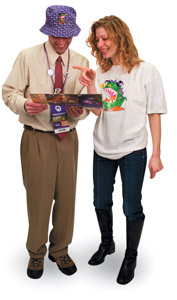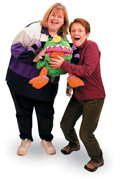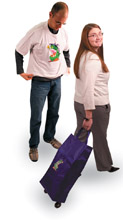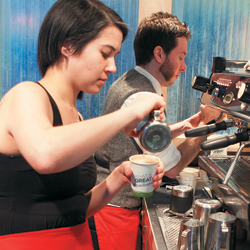promotions |
 |
  erry Talbot knows that the real monsters in life don't always turn into bats or howl at the moon. The director of marketing events for Monster Worldwide Inc. - billed by business-reference site Hoovers.com as the world's top job-search Web site with more than 75 million résumés on file - Talbot knows firsthand that the real bogeymen are budget cuts and bottom lines. That's because Maynard, MA-based Monster trimmed its budget for the Society for Human Resource Management (SHRM) 59th Annual Conference and Exposition, shaving 50 percent off the top for one of its most important shows. erry Talbot knows that the real monsters in life don't always turn into bats or howl at the moon. The director of marketing events for Monster Worldwide Inc. - billed by business-reference site Hoovers.com as the world's top job-search Web site with more than 75 million résumés on file - Talbot knows firsthand that the real bogeymen are budget cuts and bottom lines. That's because Maynard, MA-based Monster trimmed its budget for the Society for Human Resource Management (SHRM) 59th Annual Conference and Exposition, shaving 50 percent off the top for one of its most important shows.
 The budget-busting blow came in response to competitors such as CareerBuilder.com, Yahoo! HotJobs, and Craigslist Inc. stomping on Monster like Godzilla on Tokyo for slices of the $17 billion classified-ad industry. The number of visitors to the Yahoo! HotJobs site, for example, increased 53 percent from 2006 to 2007, compared to a modest 4-percent increase for Monster. And by early 2007, Craigslist was listing two jobs for every one job posted by Monster in at least 40 of the 50 most populated areas of the United States. This competition resulted in a 28-percent plummet in profits for its parent company, Monster Worldwide Inc., in the second quarter of 2007, which prompted it to cut 800 jobs (about 15 percent of its total workforce) and tighten budgets in almost every division to boost its operating margin from 19 to 25 percent. The budget-busting blow came in response to competitors such as CareerBuilder.com, Yahoo! HotJobs, and Craigslist Inc. stomping on Monster like Godzilla on Tokyo for slices of the $17 billion classified-ad industry. The number of visitors to the Yahoo! HotJobs site, for example, increased 53 percent from 2006 to 2007, compared to a modest 4-percent increase for Monster. And by early 2007, Craigslist was listing two jobs for every one job posted by Monster in at least 40 of the 50 most populated areas of the United States. This competition resulted in a 28-percent plummet in profits for its parent company, Monster Worldwide Inc., in the second quarter of 2007, which prompted it to cut 800 jobs (about 15 percent of its total workforce) and tighten budgets in almost every division to boost its operating margin from 19 to 25 percent.
Before the budget cuts, Monster's at-show branding was in visitors' faces from the moment they stepped off the plane to the moment they stepped back on. At the 2006 SHRM show, held in Washington, DC, Monster chauffeured attendees to their hotels in stretch Hummer limousines, hosted 1,500 guests at swanky after-hours parties, squired attendees on city-wide tours in double-decker buses, and held spa parties with manicures and pedicures for prospects. Given the budget cuts, those promotions were as dead as Forest Lawn.
But that didn't stop Monster from wanting Talbot to deliver King Kong results on a munchkin budget for the 2007 SHRM conference held last June in Las Vegas. The exhibition was vital to Monster's efforts to keep ahead of its rivals, drawing almost 15,000 members of the world's largest human-resource-management association. Despite her previous record-setting performance - including doubling booth attendance at the 2006 SHRM - she wasn't only expected to make do with the budget cuts at the 2007 SHRM conference, she was expected to break records again for leads, demos, and presentations. Talbot, a three-year veteran of Monster's marketing department, attacked the challenge with the ferocity of a head butt. "I do very well under pressure," Talbot says, "because I don't have any other choice."
Management also told Talbot to focus more on face-to-face marketing with its customers. "I thought long and hard about how I would accomplish that," Talbot says, "and didn't stop until I came up with a solution." Ultimately, she devised a strategy any fan of zombie movies would appreciate: Turn attendees into a roving - and cost-effective - horde of ambassadors for your brand and your booth.
|
 |
|
Mass Marketing
Challenged with a slashed budget and a revamped marketing strategy that went from flashy to frugal, Talbot had to rethink how she would use her remaining financial resources. In a way, lopping off the pedicures and the Hummers made her job easier. Those frills had consumed approximately 75 percent of her previous marketing budget, which meant that even with a 50-percent budget reduction, she had more to play with to entice customers to - and keep them inside - the booth. With that in mind, Talbot looked for ways to invest the money in promotions and in-booth activities that had worked well in the past, instead of experimenting with anything radically different.

She started with pre-show mailers sent to all 15,000 pre-registered attendees. The lumpy, electric-violet 4-by-6-inch snail-mail packages came with a guide to booth activities, a lanyard and badge featuring the Monster mascot's paw prints, and Skittles-colored Mardi Gras beads. The lure was bright, shiny, and simple: All attendees had to do to win a variety of prizes from iPods to T-shirts was have their badges scanned after taking part in booth activities, such as demos and games. They could also win prizes if Monster staffers spotted them wearing their badges on the show floor. "We made it easy to win," Talbot says, "by asking them to do what they do anyway - wear a badge at the show and walk the aisles."
Splashy pre-show mailers weren't the only bait Talbot dangled to lure attendees into the exhibit. Aside from Monster's role as a show sponsor - it placed a full-page advertisement in the official show guide - Monster paid for a belly-band ad on HR Magazine, the official monthly publication of the SHRM that was room dropped to all attendees. Monster also arranged branded door hangers to be dropped on the hotel room doors. The topside of the hangers read "Busy at work," while the reverse said "Come hang out with me." "The hangers weren't as luxurious - or expensive - as spa parties," Talbot says, "but they had one advantage over them: Attendees could take them home and use them for a long time after the show. You can't do that with a manicure."
Earn While You Learn
Piqued by the intriguing mailer, the ads, and the room drop, visitors flooded Monster's 60-by-60-foot booth. With more focus on product education - and with the budgetary wiggle room Talbot enjoyed by eliminating the extravagances - Monster spent 10 percent more on the exhibit itself, expanding it by 125 percent from a 40-by-40-foot exhibit in 2006. Like the booth, staffing was another resource Talbot was able to augment rather than abridge. Instead of the 60 booth staffers Monster had in 2006, it now had a staff of 100 to greet the banzai charge of visitors. "With more staff we could engage more people to tell them about our products, keeping them in the booth instead of just letting them walk in and out without talking to one of us," Talbot says.
|
 |
|
 Once attendees were inside the enlarged booth, Talbot had a cunning plan to keep them captive. "I knew how much visitors always enjoyed our product demos and the giveaways," Talbot says. "Maybe I couldn't do limos and tours this time, but I could do smarter giveaways they would come to the booth for, and that other attendees would see all over the floor." With more staff and space, Monster boosted the number of different demos it gave from 12 in 2006 to 27 in 2007, allow-ing it to show attendees the products it hoped would keep the company ahead of its rivals. The bulked-up crew also steered visitors to 19 separate stations highlighting Monster's services where they could win a laptop computer, an Xbox game console, or branded hats in Monster's neon-grape or lime-popsicle corporate colors. Once attendees were inside the enlarged booth, Talbot had a cunning plan to keep them captive. "I knew how much visitors always enjoyed our product demos and the giveaways," Talbot says. "Maybe I couldn't do limos and tours this time, but I could do smarter giveaways they would come to the booth for, and that other attendees would see all over the floor." With more staff and space, Monster boosted the number of different demos it gave from 12 in 2006 to 27 in 2007, allow-ing it to show attendees the products it hoped would keep the company ahead of its rivals. The bulked-up crew also steered visitors to 19 separate stations highlighting Monster's services where they could win a laptop computer, an Xbox game console, or branded hats in Monster's neon-grape or lime-popsicle corporate colors.
In all, Talbot stocked the booth with a collection of 12 different branded items, ranging from hats and hand sanitizers to T-shirts and misting fans. Spending about 20 percent of the total budget on giveaways (in 2006, giveaways accounted for just 15 percent), the freebies by themselves wouldn't make the eyes bug out of your head. They weren't expensive, they weren't unusual, and they probably wouldn't give Monster the same mileage with attendees that a Toyota Prius giveaway at the Yahoo! HotJobs booth would give the up-and-coming rival. But what set the freebies apart is the ingenious - OK, devious - way Talbot tweaked them.
Giving It All Away
In 2006, some of the giveaways, such as the iPods, were generic, which did little to promote Monster except to the one person who received it. In 2007, Talbot made sure all of the giveaways were branded with the highly recognizable company logo and colors, which extended the company brand to anyone who received - or saw - the items. Monster also made many of the branded giveaways too large to fit easily into a bag, so attendees usually had to wear or display them openly. Others small enough to slip inside a tote were designed to have a high enough value that attendees would likely keep and use them after the show.
 Talbot also made sure attendees had to earn the freebies by scanning their badges, attending a demo, offering a testimonial, or even shouting out loud. If they had to work for them, that meant they had to spend more time in Monster's booth earning giveaways that would eventually act as free moving ads for Monster. Talbot also made sure attendees had to earn the freebies by scanning their badges, attending a demo, offering a testimonial, or even shouting out loud. If they had to work for them, that meant they had to spend more time in Monster's booth earning giveaways that would eventually act as free moving ads for Monster.
For example, in the middle of the booth, Monster held two product demos. In exchange for attending both of the demos, visitors received a branded bag with wheels, a popular perennial giveaway at previous shows, which attendees liked for its mobile storage. "Giving away a bag with wheels at a trade show is like giving away a gold bar," Talbot says. Now that it had become a Monster tradition, Talbot knew people would come to the booth for the bag alone - and that was when she had another eureka moment. If she could count on the bags being a draw by themselves, why not find a way to make them do double-duty as a highly visible moving ad for the company? "I thought, why not put purple light wheels on this bag?" Talbot says. The lavender lights turned attendees hauling them into an illuminated army of billboards for the Monster brand.
Every hour, Monster held a game called Factoid Feud in a theater near the back of its booth. Selecting six people to participate in the moderated contest, the staff crowded up to 250 visitors at once into the theater to watch the game. While the emcee lobbed no-Mensa-membership-necessary questions (e.g., "What is the No. 1 online career resource site?") to the contestants who could win GPS devices for answering questions correctly, anyone in the surrounding throng yelling the company's new slogan "Monster works for me" received a stuffed Monster mascot. The shouting created a high-decibel ad for Monster that sonic-boomed through the show floor.
 Shouting like a cheerleader wasn't the only way to snag a prize. Monster staffers solicited spontaneous testimonials from booth visitors. After taping their video endorsements, visitors received one of the Monster mascot dolls. Even attendees outside the booth's borders could win. If staffers spotted attendees wearing their Monster badges on the show floor, they were awarded a grab bag of Monster merchandise: a coffee mug, T-shirt, iPod, and a Monster-mastcot figurine, all stuffed in a bag featuring the company's corporate colors. Shouting like a cheerleader wasn't the only way to snag a prize. Monster staffers solicited spontaneous testimonials from booth visitors. After taping their video endorsements, visitors received one of the Monster mascot dolls. Even attendees outside the booth's borders could win. If staffers spotted attendees wearing their Monster badges on the show floor, they were awarded a grab bag of Monster merchandise: a coffee mug, T-shirt, iPod, and a Monster-mastcot figurine, all stuffed in a bag featuring the company's corporate colors.
But Talbot's strategy went well beyond giveaways and games. Besides dimming the lights and pumping in the scent of cypress-lemon tea (a calming fragrance that aroma therapists prescribe for everything from headaches to menopause) to create a more soothing atmosphere, she arranged for Allan Downing, creator of the popular Monster mascot, Trumpasaurus (Trump), to appear in the booth. As closely identified with Monster as the gecko is with Geico Corp., the company icon and its "father" drew hundreds with an attraction no other exhibitor could hope to match. Nearly 800 visitors took their photo with Trump, almost 5 percent of the total show attendance. As a judge said, "Bringing in the inventor of Trump to sign autographs was brilliant."
Monster continued to extend its presence after the show was over. It followed up with all of the show's attendees, sending them post-show mailers the same size and color of the pre-show mailing, thus creating a kind of ubiquitous presence and continuity. Each mailer contained a branded pen, note pad, and information on all of the products the company displayed in its exhibit. Even the videotaped customer testimonials found a second life when Monster integrated them into its sales force's presentations when they courted customers.
Less is More - a Lot More
 The results from the show were phenomenal: By the end of the conference, nearly 8,000 people, or about 53 percent of the total show attendance, were carrying around an average of five Monster giveaways, turning the exhibit hall into a purple and green haze. "We wanted to blanket the show floor," Talbot says, "and that's what we did, with half the budget." The results from the show were phenomenal: By the end of the conference, nearly 8,000 people, or about 53 percent of the total show attendance, were carrying around an average of five Monster giveaways, turning the exhibit hall into a purple and green haze. "We wanted to blanket the show floor," Talbot says, "and that's what we did, with half the budget."
Even more impressive was the way in which Monster rose to the challenge posed by its competitors. It was vital the company show off its new and improved products to counter the increasing popularity of Yahoo! HotJobs and CareeerBuilder.com. Hoping to give about 4,900 product demonstrations, it racked up 7,600 of them, smashing the 2006 mark by 71 percent. Tasked to increase the 500 people who attended the theater presentations in 2006 to 1,000, Talbot quadrupled the old mark to a whopping 2,000. Aiming for 10 customer testimonials, Monster gathered 58, nearly six times its goal.
But those prodigious numbers would be as effective as a résumé with misspelled words if there wasn't a quantifiable payoff. Monster wanted to generate 10 percent more leads than the 2006 show; it garnered 6,500, an impressive jump of 20 percent. "Talbot raised the bar by doing smarter marketing," the judges said. "All elements were tied together for a consistent integrated campaign. She used big thinking and a limited budget to create a 'monster' impact." e
|
Charles Pappas, staff writer;
cpappas@exhibitormagazine.com |
|
|





 erry Talbot knows that the real monsters in life don't always turn into bats or howl at the moon. The director of marketing events for Monster Worldwide Inc. - billed by business-reference site Hoovers.com as the world's top job-search Web site with more than 75 million résumés on file - Talbot knows firsthand that the real bogeymen are budget cuts and bottom lines. That's because Maynard, MA-based Monster trimmed its budget for the Society for Human Resource Management (SHRM) 59th Annual Conference and Exposition, shaving 50 percent off the top for one of its most important shows.
erry Talbot knows that the real monsters in life don't always turn into bats or howl at the moon. The director of marketing events for Monster Worldwide Inc. - billed by business-reference site Hoovers.com as the world's top job-search Web site with more than 75 million résumés on file - Talbot knows firsthand that the real bogeymen are budget cuts and bottom lines. That's because Maynard, MA-based Monster trimmed its budget for the Society for Human Resource Management (SHRM) 59th Annual Conference and Exposition, shaving 50 percent off the top for one of its most important shows.  The budget-busting blow came in response to competitors such as CareerBuilder.com, Yahoo! HotJobs, and Craigslist Inc. stomping on Monster like Godzilla on Tokyo for slices of the $17 billion classified-ad industry. The number of visitors to the Yahoo! HotJobs site, for example, increased 53 percent from 2006 to 2007, compared to a modest 4-percent increase for Monster. And by early 2007, Craigslist was listing two jobs for every one job posted by Monster in at least 40 of the 50 most populated areas of the United States. This competition resulted in a 28-percent plummet in profits for its parent company, Monster Worldwide Inc., in the second quarter of 2007, which prompted it to cut 800 jobs (about 15 percent of its total workforce) and tighten budgets in almost every division to boost its operating margin from 19 to 25 percent.
The budget-busting blow came in response to competitors such as CareerBuilder.com, Yahoo! HotJobs, and Craigslist Inc. stomping on Monster like Godzilla on Tokyo for slices of the $17 billion classified-ad industry. The number of visitors to the Yahoo! HotJobs site, for example, increased 53 percent from 2006 to 2007, compared to a modest 4-percent increase for Monster. And by early 2007, Craigslist was listing two jobs for every one job posted by Monster in at least 40 of the 50 most populated areas of the United States. This competition resulted in a 28-percent plummet in profits for its parent company, Monster Worldwide Inc., in the second quarter of 2007, which prompted it to cut 800 jobs (about 15 percent of its total workforce) and tighten budgets in almost every division to boost its operating margin from 19 to 25 percent.


 Once attendees were inside the enlarged booth, Talbot had a cunning plan to keep them captive. "I knew how much visitors always enjoyed our product demos and the giveaways," Talbot says. "Maybe I couldn't do limos and tours this time, but I could do smarter giveaways they would come to the booth for, and that other attendees would see all over the floor." With more staff and space, Monster boosted the number of different demos it gave from 12 in 2006 to 27 in 2007, allow-ing it to show attendees the products it hoped would keep the company ahead of its rivals. The bulked-up crew also steered visitors to 19 separate stations highlighting Monster's services where they could win a laptop computer, an Xbox game console, or branded hats in Monster's neon-grape or lime-popsicle corporate colors.
Once attendees were inside the enlarged booth, Talbot had a cunning plan to keep them captive. "I knew how much visitors always enjoyed our product demos and the giveaways," Talbot says. "Maybe I couldn't do limos and tours this time, but I could do smarter giveaways they would come to the booth for, and that other attendees would see all over the floor." With more staff and space, Monster boosted the number of different demos it gave from 12 in 2006 to 27 in 2007, allow-ing it to show attendees the products it hoped would keep the company ahead of its rivals. The bulked-up crew also steered visitors to 19 separate stations highlighting Monster's services where they could win a laptop computer, an Xbox game console, or branded hats in Monster's neon-grape or lime-popsicle corporate colors.  Talbot also made sure attendees had to earn the freebies by scanning their badges, attending a demo, offering a testimonial, or even shouting out loud. If they had to work for them, that meant they had to spend more time in Monster's booth earning giveaways that would eventually act as free moving ads for Monster.
Talbot also made sure attendees had to earn the freebies by scanning their badges, attending a demo, offering a testimonial, or even shouting out loud. If they had to work for them, that meant they had to spend more time in Monster's booth earning giveaways that would eventually act as free moving ads for Monster.  Shouting like a cheerleader wasn't the only way to snag a prize. Monster staffers solicited spontaneous testimonials from booth visitors. After taping their video endorsements, visitors received one of the Monster mascot dolls. Even attendees outside the booth's borders could win. If staffers spotted attendees wearing their Monster badges on the show floor, they were awarded a grab bag of Monster merchandise: a coffee mug, T-shirt, iPod, and a Monster-mastcot figurine, all stuffed in a bag featuring the company's corporate colors.
Shouting like a cheerleader wasn't the only way to snag a prize. Monster staffers solicited spontaneous testimonials from booth visitors. After taping their video endorsements, visitors received one of the Monster mascot dolls. Even attendees outside the booth's borders could win. If staffers spotted attendees wearing their Monster badges on the show floor, they were awarded a grab bag of Monster merchandise: a coffee mug, T-shirt, iPod, and a Monster-mastcot figurine, all stuffed in a bag featuring the company's corporate colors. The results from the show were phenomenal: By the end of the conference, nearly 8,000 people, or about 53 percent of the total show attendance, were carrying around an average of five Monster giveaways, turning the exhibit hall into a purple and green haze. "We wanted to blanket the show floor," Talbot says, "and that's what we did, with half the budget."
The results from the show were phenomenal: By the end of the conference, nearly 8,000 people, or about 53 percent of the total show attendance, were carrying around an average of five Monster giveaways, turning the exhibit hall into a purple and green haze. "We wanted to blanket the show floor," Talbot says, "and that's what we did, with half the budget."


